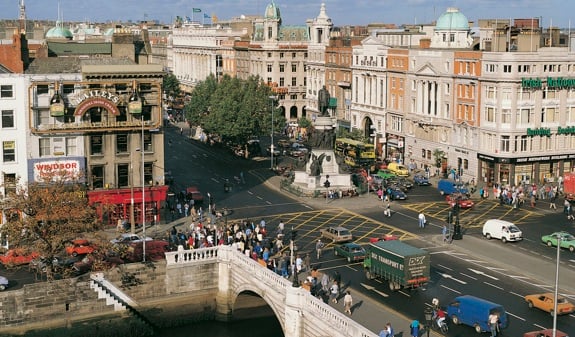Ireland looking to lure investors by issuing debt that comes with a visa; 'international charm offensive'
Ireland plans to sell a bond with a different kind of coupon: a resident's visa.
Under proposals to be laid out next month, the government will offer the visas to investors who spend at least 2 million euros ($2.7 million) on a new “low-interest” security, 1 million euros on property or invest in an Irish company. The sale is aimed at people from outside the European Union who need permits to live and work in the 27-member bloc.
“You might have businesspeople in China or in Brazil or in various non-EU countries who would like to be entitled to come and reside here,” Irish Justice Minister Alan Shatter said in an interview in Dublin. “The scheme has great potential.”
The proposal is among the more unusual in a wave of initiatives to win investment as Ireland seeks to rebuild its economy and markets after one of the biggest banking collapses in history. The government is also offering finders' fees for people bringing in jobs and tax breaks for executives moving to the country, one of three euro members that sought an international bailout during the European debt crisis.
Ireland is undertaking an “international charm offensive,” Prime Minister Enda Kenny said after former U.S. President Bill Clinton hosted a meeting in New York on Feb. 9 to drum up interest in Ireland among investors. Chinese Vice President Xi Jinping this month visited the country.
Kenny said yesterday Ireland will hold a referendum to ratify the European agreement on a new rescue fund.
Doing Business
“The further we are into the crisis the more you need to come up with something a little bit more,” said Austin Hughes, an economist at KBC (KBC) Bank Ireland in Dublin. “The various little tasters that the government is offering help create an impression of an economy that wants to do business.”
Ireland's October 2020 bonds yield 6.81 percent, down from a euro-era high of 13.8 percent on July 18, as the government reassured investors that they would be repaid, in contrast to the losses imposed on Greek bondholders.
Shatter has said using the inducement of residency has worked in other countries. The U.S. offers visas for investors with “substantial amounts of capital,” according to documentation of the US immigration service, while Latvia and Cyprus offer residency in exchange for real estate.
In Ireland, the program is set to encompass property ultimately controlled by the National Asset Management Agency, according to the Justice Ministry. The so-called bad bank, set up to purge Ireland's lenders of risky loans, had more than 1,000 assets listed for sale. Visas are also available for an investment in an Irish company, a charity endowment, as well as the specially created bond.
Five Years
The bond, which isn't tradable, must be held by the visa holder for a minimum of five years.
The government hasn't yet set the coupon, the rate of interest payable to bondholders. Buyers will be able to bring family members with them, the Justice Ministry said. A spokesman for the country's debt agency declined to comment.
The government is also offering an income tax exemption on 30 percent of salaries between 75,000 euros and 500,000 euros for workers who relocate to Ireland with their existing employer in the next three years.
“The issue multinationals have faced over the last couple of years is that because the tax rate has become punitive, it isn't attractive for employees to come to Ireland,” said Ronan Colleran, managing director of Dublin-based headhunter Accreate Executive Search, who is advising clients on the program.
Luring Jobs
The government will also pay a fee of about 4,000 euros to encourage people to attract overseas companies not already targeted by the state. Irish unemployment tripled to an average 14.2 percent last year from 4.5 percent in 2007, as the economy shrunk by about 15 percent over that period.
Similar programs have drawn controversy in the past. In 1998, Ireland scrapped a so-called passports-for-sale operation on concern that it was potentially open to abuse. Within the last 18 months, Latvian nationalists protested against the granting of visas for investors in real estate, because of fear that property would be sold to Russians. Latvia gained independence from the former Soviet Union in 1991.
“It is very hard to create jobs in the domestic economy with indigenous companies just given the difficulties that are there, but I think they are doing as well as they possibly could at the moment,” said Colleran. “Making a silk purse out of a sow's ear is probably what you would describe it as.”
--Bloomberg News--







